Minister of Education on the 18th edition of the “Government Page” TV show, Friday, March 6th, at 8:00 p.m., on RTTL
The 18th edition of the “Government Page” TV show will be broadcast this Friday, March 6th, 2026, at 8:00 p.m., on Radio and Television of Timor-Leste (RTTL) and on official digital platforms.
This edition features the participation of the Minister of Education, Dulce de Jesus Soares, who outlines the priorities, challenges, and strategic guidelines of the national education policy, with a focus on enhancing the quality of education through curriculum review and teacher training, as well as inclusive education, technological modernisation in schools, and the promotion of official languages. 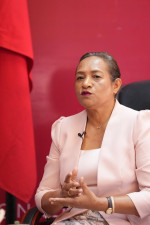

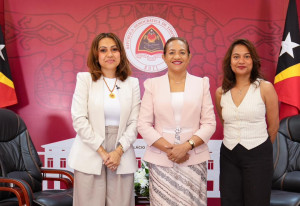
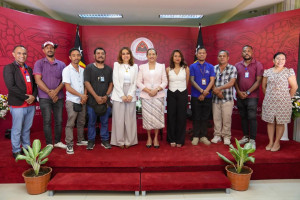
During the interview, the Minister explains that the Ministry has five core areas of action, which are “the curriculum, teacher training, school infrastructure, school management, and inclusive education.” In the area of curriculum, she highlights the ongoing process of reviewing the curricula for various levels of education, developed by teams of experts and teachers, which includes testing and pilot projects in schools, the production of books and guides, and teacher training before phased implementation.
The Minister also highlighted the role of INFORDEPE in initial and continuous teacher training, including classroom mentoring mechanisms and learning support strategies like remedial classes. Concerning challenges, she discussed the limitations related to school infrastructure and student-teacher ratios, as well as issues such as replacing retired teachers and preventing school dropouts, emphasising the importance of co-ordination with families, community leaders, and parent-teacher associations.
The interview also provides clarifications on the reality of so-called “international schools,” explaining the licensing framework and minimum standards required for operation, as well as the difference between licensing and accreditation. It also discusses the strengthening of Portuguese as the official language of instruction, including the development of CAFE schools, teacher training, and the contextualisation of content to support the learning process. In the field of innovation, the Minister presents measures currently underway for the gradual introduction of technology in management and teaching practices, including digital data collection tools, hybrid training, and the progressive provision of equipment.
In exercising her powers, the Minister of Education is responsible for designing, implementing, coordinating, and evaluating public policies in the areas of education and qualifications, from preschool to secondary education. This includes special forms of education, promoting lifelong learning, and consolidating and enhancing official languages. She is also responsible for ensuring the right to education, defining the national curriculum, guaranteeing the quality of the education system, and promoting the training and development of education professionals.
The “Government Page” TV show is an initiative of the Office of the Government Spokesperson, led by the Minister of the Presidency of the Council of Ministers, Agio Pereira, in partnership with RTTL, the national media, and digital platforms. Its aim is to enhance government transparency and ensure the public’s access to the Executive’s main actions and decisions. The programme is presented by Nélia Chaves and produced by Ika Moniz, with technical support from the communications teams of the Council of Ministers, the Office of the Prime Minister, and the office of the interviewed member of the Government.
Government Spokesperson, Minister Agio Pereira, reaffirms that the “Government Page” TV show is an important tool for promoting accountability and dialogue between the Government and citizens.
The Government invites everyone to tune into this episode of “Government Page” on Friday, March 6th, 2026, at 8:00 p.m., on RTTL and official social media channels.
url: https://timor-leste.gov.tl?lang=en&p=0Minister of the Presidency of the Council of Ministers meets with the Civil Service Commission
The Minister of the Presidency of the Council of Ministers, Agio Pereira, met with the President of the Civil Service Commission (CFP), Agostinho Letêncio de Deus, accompanied by commissioners Agapito da Conceição, Jorge Paiva Araújo, and Anita Tavares Ribeiro de Jesus, to review the status of the work carried out by the Commission and discuss priorities for 2026 in the context of public administration reform and state human resources management. 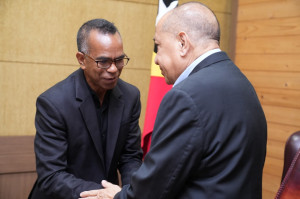
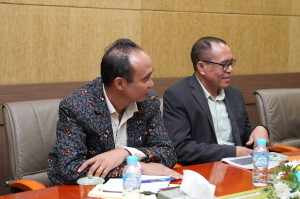
During the meeting, the CFP President delivered a report on the Commission’s recent activities, including oversight of discipline, mandatory retirement, and human resource management, with a particular emphasis on the education and health sectors. It was also noted that documents will be prepared for submission to the Council of Ministers to define strategic guidelines.
In the context of institutional oversight activities, CFP members reported that monitoring efforts in ministries and public institutions will be enhanced in 2026, including oversight visits conducted in coordination with other State institutions. These activities have enabled the identification of issues related to the administrative and financial management of some public entities.
During the meeting, discussions also centred on replacing teachers who have reached retirement age, promoting healthcare professionals, and reforming the public administration process, including proposals to reorganise careers, review the size of the state workforce, and strengthen payment management and control systems.
url: https://timor-leste.gov.tl?lang=en&p=0Jesuína Maria Ferreira Gomes takes office as Vice Minister of Foreign Affairs and Cooperation
The President of the Republic, José Ramos-Horta, today, March 5th, 2026, swore in Jesuína Maria Ferreira Gomes as Vice Minister of Foreign Affairs and Cooperation of the 9th Constitutional Government, in a ceremony held at the Nicolau Lobato Presidential Palace in Dili.
The appointment was made by Presidential Decree No. 20/2026 of March 4th, pursuant to Article 86(h) of the Constitution of Timor-Leste, upon the proposal of Prime Minister Kay Rala Xanana Gusmão. 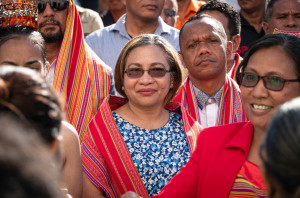
Before this appointment, Jesuína Maria Ferreira Gomes served as Chief of Staff to the President of the Republic. She also previously held the role of Ombudsman for Human Rights and Justice.
The creation of the position of Vice-Minister for Foreign Affairs and Cooperation results from the second amendment to the organic law of the 9th Constitutional Government, approved by the Council of Ministers at its meeting on March 4th, through Decree-Law No. 11/2026.
The Decree-Law establishes the inclusion of the Vice Minister in the Government’s composition, responsible for substituting the Minister of Foreign Affairs and Cooperation when absent or hindered, and aiding him in managing his political, administrative, and financial duties related to implementing the country’s foreign policy, ensuring its unity and coherence.
url: https://timor-leste.gov.tl?lang=en&p=0Meeting of the Council of Ministers on March 4th, 2026
Presidency of the Council of Ministers
Spokesperson of the Government of Timor-Leste
Ninth Constitutional Government
……………………………………………………………………………………………………………..
Press Release
Meeting of the Council of Ministers on March 4th, 2026
The Council of Ministers met at the Kay Rala Xanana Gusmão Auditorium of the Ministry of Finance in Dili and approved the draft Decree-Law presented by the Minister of Foreign Affairs and Cooperation, which aims to make the second amendment to the Organic Law of the 9th Constitutional Government.
The aim of this amendment is to include the position of Vice Minister of Foreign Affairs and Cooperation, who will not only replace the Minister of Foreign Affairs and Cooperation in his absence or when he is prevented from acting, but will also assist in the exercise of his political, administrative, and financial functions as the person responsible for implementing the country’s foreign policy, ensuring its unity and consistency.
*****
The Council of Ministers approved the government’s draft resolution, presented by the Minister of Finance, which provides for the opening of a trust account between the Ministry of Finance and EDTL, E.P., at the Central Bank of Timor-Leste, to ensure the implementation of the State Guarantee associated with the development of the TIM Solar Power Plant Project.
The measure stems from the Power Purchase Agreement signed by EDTL with the international consortium responsible for developing the project and aims to ensure that, should the state guarantee be triggered, there are clear and immediate mechanisms in place to make the expected payments, thereby ensuring both transparency and traceability of financial transactions.
Under the terms of the Government Resolution now approved, the Ministry of Finance will open a trust account of up to US$18 million, which will be used exclusively to cover payments under the State Guarantee for the Tim Solar Panel Project. This amount will be deducted from the total of US$121.9 million already authorised for transfers from the General State Budget to EDTL under the “802 Electricity” programme, aimed at ensuring the continuity of the public electricity supply service.
*****
The draft Government Decree presented by the Minister of Trade and Industry was also approved, regulating the procedures for granting licences and conducting inspections in the context of sectoral licensing of commercial activities, and approving the relevant forms and templates.
This draft Government Decree aims to implement the sectoral licensing regime for commercial activities set out in Decree-Law No. 89/2023 of December 20th, as amended by Decree-Law No. 5/2026 of February 4th, defining the administrative procedures required for granting licences to commercial establishments classified as medium or high risk.
*****
The Minister of the Presidency of the Council of Ministers gave a preliminary presentation of the proposal for a cybersecurity legislative framework.
This initiative provides for the development of a legislative framework to strengthen the national legal and institutional framework in this area, including the definition of a National Cybersecurity Strategy and the approval of legal regimes for cyberspace security, digital services, cybercrime, and the protection of whistleblowers.
The proposed legislative framework aims to enhance the security of networks and information systems, protect critical infrastructure and essential services, combat crime in the digital environment, and promote the safe and responsible use of cyberspace by citizens, businesses, and public institutions. The measures under consideration also include establishing institutional mechanisms for strategic coordination and operational responses to cybersecurity incidents, as well as instruments for national and international cooperation in this area.
This initiative aims to strengthen the State’s capacity to prevent, detect, and respond to threats in the digital domain, thereby protecting national interests, ensuring the secure functioning of public administration, and building citizens’ trust in the digital environment.
*****
The Minister of Planning and Strategic Investment presented to the Council of Ministers the 2011-2030 Timor-Leste Strategic Development Plan Progress Monitoring Report, which assesses the degree of implementation of the goals set for the end of 2024.
The report analyses the progress of 199 short- and medium-term goals, distributed across five major sectors (Social Capital, Infrastructure, Economic Development, Institutional Framework, and Macroeconomic Outlook), and identifies advances achieved, persistent structural challenges, and priorities for action for the period up to 2030, with a view to supporting decision-making and strengthening the effectiveness of the Plan’s implementation.
*****
The Council of Ministers also reviewed the presentation of the Report of the Commission serving in the Oe-Cússe Ambeno Special Administrative Region (RAEOA).
The mission, conducted between February 22nd and 26th, February 2026, aimed to assess the legal framework and institutional functioning of the RAEOA, and to clarify procedures for administrative, financial, and human resources management in the Region. The team included representatives from the Government and various State institutions, including members of the Ministry of Public Works, the Ministry of Finance, the Civil Service Commission, and relevant technical services.
During the presentation, the legislation applicable to RAEOA was analysed, as were the rules relating to the execution of the General State Budget and the Procurement and Public Contracts Code. The Commission also presented information on the institutional organisation of the Region, planning, budgeting, and budget execution procedures, as well as the rules applicable to recruitment and personnel management.
*****
Lastly, the Council of Ministers reviewed a presentation by the Secretary of State for Equality on Timor-Leste’s participation in the annual session of the United Nations Commission on the Status of Women (CSW), which will take place from March 9th to 19th, 2026 at the United Nations headquarters in New York.
During the presentation, the Secretary of State highlighted the role of this commission as the United Nations’ main intergovernmental body dedicated to promoting gender equality and women’s empowerment, bringing together Member States and international partners annually to assess progress and set policy guidelines in this area.
The Secretary of State, who will represent Timor-Leste at the event, also announced that she will co-organise a side event in partnership with UN Women and several countries to share experiences and strengthen gender equality policies, including efforts to prevent gender-based violence, empower women economically, and promote their participation in political life. This participation will also allow the presentation of national developments in this area and strengthen international cooperation in this field. END
url: https://timor-leste.gov.tl?lang=en&p=0Timor-Leste advocates a balanced, inclusive, and rules-based approach to ASEAN’s economic security
url: https://timor-leste.gov.tl?lang=en&p=0Timor-Leste and France strengthen economic cooperation and partnership in human capital development
url: https://timor-leste.gov.tl?lang=en&p=0Prime Minister concludes first phase of visits to municipalities as part of preparations for local government
url: https://timor-leste.gov.tl?lang=en&p=0Ministry of Education continues to strengthen basic education with the integration of 1,143 more teachers
url: https://timor-leste.gov.tl?lang=en&p=0Minister Samuel Marçal returns to the Government Page TV show to discuss the work carried out in the infrastructure sector
The Minister of Public Works, Samuel Marçal, participated today, February 27th, 2026, in the recording of a new episode of the Government Page TV show, focusing on ongoing strategic projects and priorities for action in the infrastructure sector.
This participation marks the return of Minister Samuel Marçal to the TV Show, following his appearance as a guest on the first episode, broadcast on March 14th, 2025, in which he presented the Government’s strategic lines for the infrastructure sector, a key area for national development. 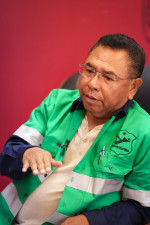
In his return to Government Page TV Show, the interview focused on the execution and application of resources in strategic infrastructure projects. Ongoing structural interventions were also discussed, along with aspects of management, maintenance, and responsibilities associated with implementing the works. The outlook for the period 2026–2028 was also shared, including strategies to mitigate the impact of flooding.
The Ministry of Public Works is responsible for the design, implementation, coordination, and evaluation of public policy in public works, housing, water supply and management, sanitation, electricity, and urban planning. It also ensures technical coordination and supervision of construction and infrastructure projects nationwide. 
Promoted by the Government Spokesperson’s Office, led by the Minister of the Presidency of the Council of Ministers, Agio Pereira, the Government Page TV show is produced in partnership with Radio and Television of Timor-Leste and the national media to strengthen government transparency, accountability, and citizens’ access to information on the Executive’s key decisions and policies. 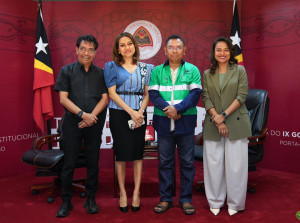
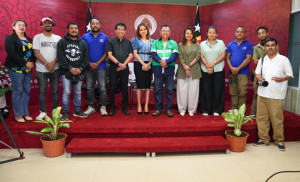
Hosted by Nélia Chaves and executive produced by Ika Moniz, Government Page TV Show is a space for institutional dialogue focused on the public interest, ensuring that the population has access to the Government’s main actions and decisions.
Today’s episode, featuring the Minister of Public Works, will be broadcast shortly on RTTL and on the Government’s digital platforms and social media channels.
All episodes already broadcast are available on the YouTube channel @PCMPAGINADOGOVERNOTIMORLEST
url: https://timor-leste.gov.tl?lang=en&p=0Minister of the Presidency of the Council of Ministers meets with Commissioner of the Anti-Corruption Commission
The Minister of the Presidency of the Council of Ministers, Agio Pereira, met on 27 February 2026 at the Government Palace in Dili with the Commissioner of the Anti-Corruption Commission (CAC), Rui Pereira dos Santos, accompanied by his team. 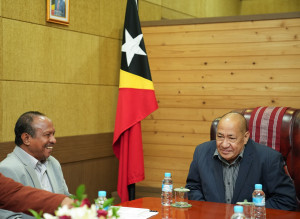
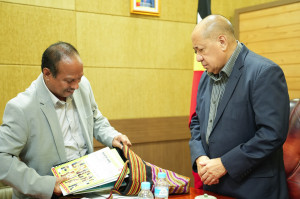
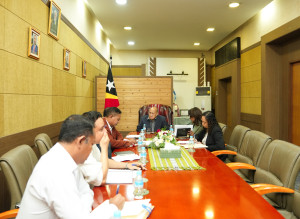
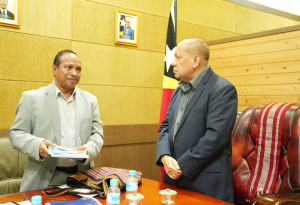
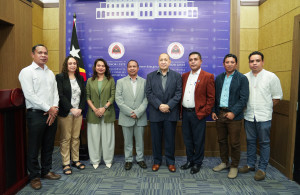
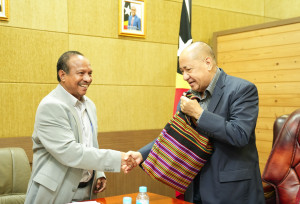
The purpose of the meeting was to present the organisational structure of the CAC and to report on the status of the services and activities carried out within the scope of its constitutional and legal mandate to prevent and combat corruption.
During the meeting, the Commissioner presented updated information on the institutional functioning of the Commission, the results achieved, the challenges identified in the execution of its duties and the prospects for strengthening institutional capacity.
During the meeting, the Minister was given a set of institutional documents and reports relating to the Commission’s activities, including strategic instruments, annual reports, monitoring actions and awareness-raising initiatives, as well as documentation relating to Timor-Leste’s international commitments in the field of preventing and combating corruption.
url: https://timor-leste.gov.tl?lang=en&p=0
















